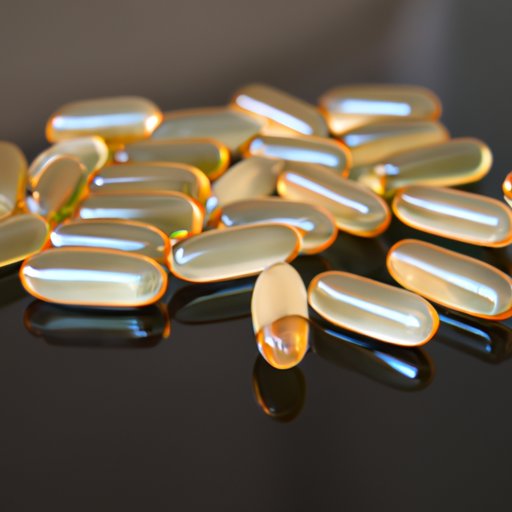
I. Introduction
Low testosterone levels are a common problem among men, particularly as they age. Many factors can contribute to low testosterone levels, including poor nutrition, lack of exercise, and certain medical conditions. Research has shown that Vitamin D has the potential to increase testosterone levels naturally. In this article, we will explore the link between Vitamin D and testosterone, and how Vitamin D supplementation can benefit male reproductive health.

II. The Link Between Vitamin D and Testosterone: A Comprehensive Study
There is scientific evidence linking Vitamin D and testosterone levels. A comprehensive study published in the Journal of Clinical Endocrinology and Metabolism found that there was a positive correlation between Vitamin D levels and testosterone levels. The study found that men with Vitamin D deficiency were more likely to have low testosterone levels.
Several other studies have supported this claim. For example, a study published in the International Journal of Endocrinology showed that Vitamin D supplementation increased testosterone levels in men with Vitamin D deficiency. Another study published in Hormone and Metabolic Research found that Vitamin D supplementation was associated with improved testosterone levels and increased sperm motility in infertile men.
III. How Vitamin D Supplementation Can Boost Testosterone Levels Naturally
Vitamin D supplementation works by stimulating the production of testosterone in the body. Vitamin D helps regulate testosterone synthesis by stimulating the Leydig cells in the testes to produce more testosterone. The recommended daily intake of Vitamin D is 600-800 IU per day.
There are several sources of Vitamin D, including sunlight, diet, and supplements. Sunlight is the most natural source of Vitamin D. However, it may be difficult to get enough Vitamin D from sunlight alone, especially during the winter months. Fatty fish, egg yolks, and fortified foods such as milk and cereal are good dietary sources of Vitamin D.
To naturally increase Vitamin D intake, spend more time outdoors, especially during the summer months when the sun is strongest. You may also want to consider taking a Vitamin D supplement.
IV. The Benefits of Getting More Vitamin D for Your Testosterone Levels
Having optimal levels of Vitamin D and testosterone can have a range of benefits for men’s health. For example, Vitamin D is important for bone health as it helps the body absorb calcium. Low testosterone levels have been linked to a higher risk of osteoporosis, a condition that weakens bones and increases the risk of fractures.
Vitamin D and testosterone also play a role in mood and energy levels. Low testosterone levels have been linked to depression, mood swings, and fatigue. Adequate levels of Vitamin D and testosterone can help improve cognitive function, mood, and energy levels.
V. Exploring the Science Behind Vitamin D and Testosterone Boosting
The relationship between Vitamin D and testosterone is complex. Vitamin D receptors are found in various organs and tissues throughout the body, including the testes. Vitamin D helps regulate the expression of genes involved in testosterone synthesis.
Vitamin D also plays a role in other bodily functions, such as immune function, inflammation, and cell growth and differentiation. Low levels of Vitamin D have been linked to a range of health problems, including heart disease, diabetes, and cancer.
VI. The Role of Vitamin D in Male Health: Increasing Testosterone Naturally
In addition to playing a crucial role in male reproductive health, Vitamin D is important for overall male health. Research has shown that optimal levels of Vitamin D can help prevent various health problems commonly associated with aging, including heart disease, diabetes, and cognitive decline.
It’s important for men to maintain optimal Vitamin D levels throughout their lifetime. Vitamin D deficiency is more common in older adults, obese individuals, and those with certain medical conditions.
VII. Vitamin D and Its Impact on Male Hormones: What Every Man Should Know
There are several misconceptions about Vitamin D supplementation and testosterone levels. One common misconception is that taking Vitamin D supplements can cause excessive testosterone production, leading to negative side effects such as aggression and mood swings. This is not supported by scientific evidence.
While Vitamin D supplementation can increase testosterone levels in men with deficiency, excessive Vitamin D intake can be harmful. High doses of Vitamin D can cause hypercalcemia, a condition that can lead to kidney stones, bone pain, and other health problems. It’s important to follow the recommended daily intake of Vitamin D and consult with a healthcare professional before taking supplements.
VIII. Breaking Down the Connection Between Vitamin D and Testosterone Production
Optimal Vitamin D levels are important for overall health and testosterone production in men. Vitamin D supplementation can help boost testosterone levels naturally and improve male reproductive health. Spend more time outdoors, eat Vitamin D-rich foods, and consider taking a Vitamin D supplement to maintain optimal Vitamin D levels throughout your lifetime.
For more information about Vitamin D and testosterone, consult with a healthcare professional or visit reputable online sources such as the National Institutes of Health or the Mayo Clinic.
IX. Conclusion
Low testosterone levels can have a range of negative health consequences for men. Vitamin D has been shown to increase testosterone levels naturally and improve male reproductive health. Optimal levels of Vitamin D are important for overall health and can help prevent various health problems commonly associated with aging. By spending more time outdoors, eating Vitamin D-rich foods, and taking a Vitamin D supplement, men can maintain optimal Vitamin D levels throughout their lifetime.




